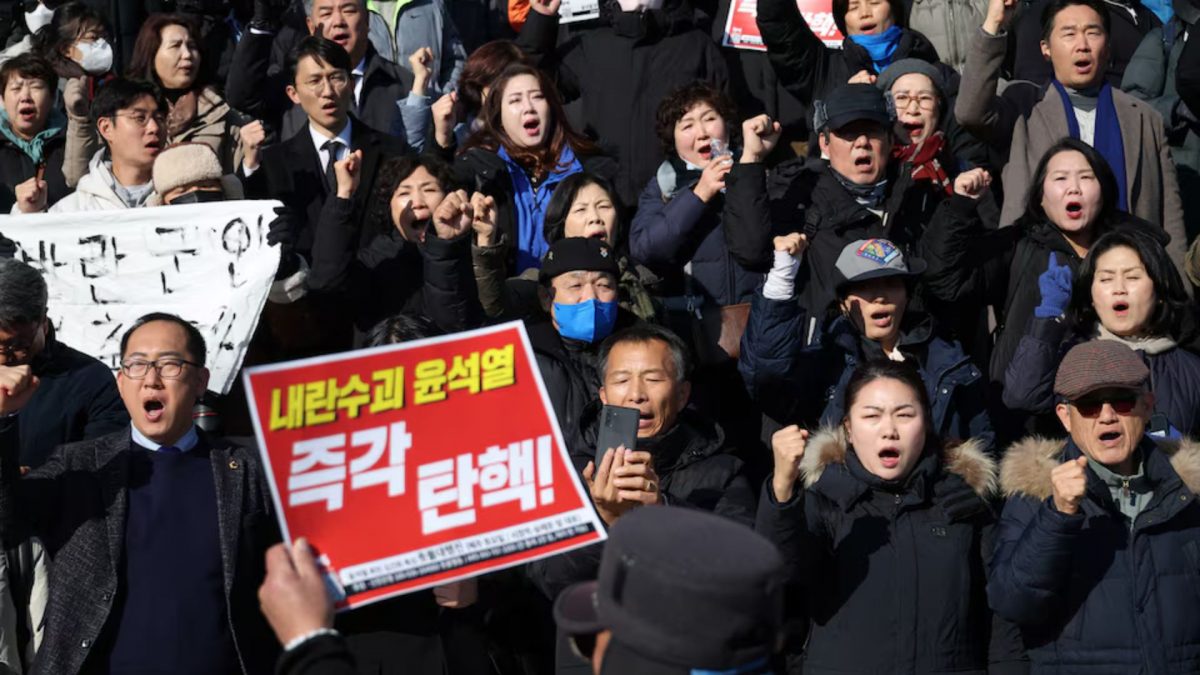With just one decision, South Korean President Yoon Suk Yeol has invited endless trouble for himself. He is now facing backlash from the Opposition led coalition in the parliament for imposing martial law, which he had to pull back within hours, but now a motion has been passed to impeach him.
On Wednesday, as many as six parties, including the main Opposition Democratic Party, came together to table an impeachment motion against Yoon in the National Assembly.
The Opposition has been accusing Yoon of violating his constitutional duty and committing a crime similar to treason when he declared martial law late Tuesday.
Impeachment motion against Yoon to be voted within 72 hours
A report by Reuters quoted a coalition of lawmakers from Opposition parties as saying that the bill to impeach Yoon should be voted within 72 hours.
Earlier in the day, South Korean lawmakers demanded Yoon to step down or face impeachment.
“The parliament should focus on immediately suspending the president’s business to pass an impeachment bill soonest,” Hwang Un-ha, one of the MPs in the coalition, said.
The leader of Yoon’s ruling People Power Party called for Defence Minister Kim Yong-hyun to be fired and the entire cabinet to resign.
Martial law imposed and pulled back within hours
Late Tuesday, Yoon made a surprise move by declaring “emergency martial law” in South Korea. He told this during an unannounced television address, accusing the Opposition of “sympathising with North Korea” and “paralysing the government with anti-state activities.”
However, within hours after imposition, the martial law was lifted as the parliament, in a late night vote rejected it and the National Assembly Speaker Woo Won Shik declared it invalid.
A majority of 190 lawmakers out of 300, including 18 members from Yoon’s party were present and they unanimously voted to block the move to impose martial law in South Korea.
Impact Shorts
More ShortsPresidential impeachment law in South Korea
The Constitution in South Korea provides for parliament to bring an impeachment motion against the president or any other high-ranking public officials if they are believed to “have violated the Constitution or any law in the performance of official duties.”
The impeachment motion of the president mandates a two-thirds majority vote by the members of the single-chamber parliament to pass. Meanwhile, a simple majority is needed to impeach other officials.
A trial is conducted by a Constitutional Court to either confirm or reject the impeachment motion, hearing evidence from parliament to determine whether the president violated the law.
Does the Opposition have that number?
Now, South Korea’s Opposition has tabled an impeachment motion against Yoon, but does it have the required number in the parliament?
Currently the parliament is controlled by Democratic Party which along with other smaller party have 192 seats, barely short of eight than the 200 required to impeach the president.
It may still be successful as some members of Yoon’s ruling People Power Party have strongly objected to his martial law declaration. However, it is still not clear whether or how many of them will join the Opposition to a vote.
For the unversed, Yoon was already facing calls for impeachment and special investigations into a scandal involving his wife.
The bill has been moved and if parliament votes to impeach Yoon, he will be suspended from exercising his powers until the result of an impeachment trial held by the Constitutional Court. During this time, the prime minister serves as leader in acting capacity.
The Constitutional Court hears oral arguments from the chair of parliament’s justice committee and from the public official or their legal counsel.
The Court has time of up to six months to confirm the impeachment by a vote of six out of the nine justices, or reject the motion.
According to Reuters report, the Constitutional Court currently has six sitting justices with three posts to be filled.


)

)
)
)
)
)
)
)
)



